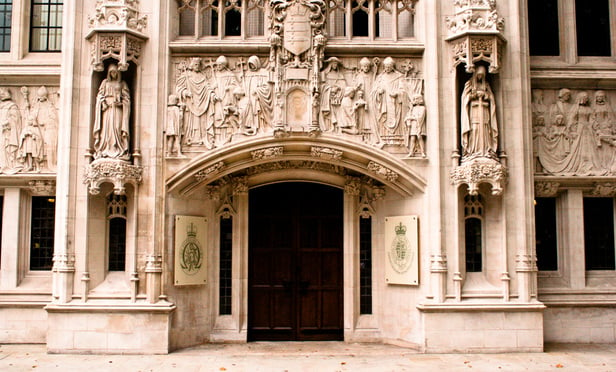How the Regeneron v Kymab Case Sets the Tone for UK Patent Law
Drug developer Kymab won its case in the U.K. Supreme Court against New York biotechnology giant Regeneron in June.
July 09, 2020 at 03:31 AM
5 minute read
When Regeneron, one of the world's largest biotech companies, opened a lawsuit against Kymab, a British biotech pioneer, back in 2013, it was the start of a David and Goliath legal battle, that came to be one of the most hotly contested patent disputes.
The case was filed by Regeneron for infringement of its patents covering mice that contain the so-called 'reverse chimaeric' immunoglobulin (i.e. antibody) gene loci, which comprise a human variable region and a mouse constant region.
At first instance, London's High Court held that, whilst Kymab's Kymouse did infringe Regeneron's patents, they were invalid seeing as none of the methods disclosed in the patents would have allowed the skilled person to make any of the mice within the claimed range without undue burden. However, that decision was later to be overturned by the Court of Appeal, which held that:
(i) using techniques found elsewhere than the patents, the skilled person could have made some mice falling within the least desirable Regeneron's claimed range; and
(ii) because all mice within the claimed range could be expected to benefit from the advantages conferred by the 'reverse chimaeric' loci (namely they would not be 'immunologically sick') the patents disclosed a principle of general application.
The Court of Appeal held that because the patents disclosed a principle of general application, it was only necessary to enable a single product within the claimed range, and that the patents were therefore valid. The Court of Appeal also held that Kymab's Kymouse – which included the full range of human variable genes – did indeed infringe the claims (even though it required significant innovative work on the part of Kymab to produce). The Court of Appeal ordered that, in the event that Kymab's appeal to the Supreme Court was not successful, Kymab's mice should be destroyed, putting in jeopardy its important work in developing therapeutic antibody products to tackle some of the world's most challenging diseases including HIV, Ebola, malaria and cancer.
As we have now come to see, and a terrific result for Kymab – the Supreme Court overturned the Court of Appeal's decision, stating that the Court of Appeal had not correctly applied the law.
The Supreme Court found that the product claims of the Regeneron patents were invalid as these claims were not enabled across their scope on the basis of the disclosure in the patents and that in the case of a product claim, the contribution to the art is not merely the inventive concept, but the ability of the skilled person to apply the inventive concept and make the relevant product. The disclosure required in the patent must therefore be sufficient to enable the skilled person to make substantially all of the types or embodiments of products within the scope of the claim, although this does not mean that every embodiment within the scope of the claim needs to have been tried, tested and proved to have been enabled to be made.
More specifically, the Supreme Court held that the Court of Appeal had incorrectly stated the essential patent bargain: in the case of a product claim, the contribution to the art is the product which is enabled to be made by the disclosure, not merely the patentee's inventive concept. As Lord Briggs put it: "Patents are about products and processes, not pure ideas." They therefore held that where a claim covers a range of products, it must be enabled across its scope, such that substantially all products across the claimed range can be made by the skilled person at the priority date without undue burden.
As legal advisor to Kymab throughout these proceedings, we are delighted to see the Supreme Court side in favour of Kymab. It is a great result for the company who have shown tremendous resilience in defending this case since 2013 and are now free to continue their innovative work and advances in the biotech sector.
Beyond this, however, the Renegeron v. Kymab judgment is of great importance, not only for the biotech and wider life sciences sector, but also for all manner of products being developed that depend on patent protection. The case has raised fundamental questions of patent law relevant to a wide variety of innovative life science companies in the UK, and the Supreme Court has confirmed that patents should not be available for inventions that are not adequately enabled.
Penny Gilbert and Siddharth Kusumakar are partners, and Joel Coles a senior associate at Powell Gilbert.
This content has been archived. It is available through our partners, LexisNexis® and Bloomberg Law.
To view this content, please continue to their sites.
Not a Lexis Subscriber?
Subscribe Now
Not a Bloomberg Law Subscriber?
Subscribe Now
NOT FOR REPRINT
© 2025 ALM Global, LLC, All Rights Reserved. Request academic re-use from www.copyright.com. All other uses, submit a request to [email protected]. For more information visit Asset & Logo Licensing.
You Might Like
View All
Pallas Partners Founder On the Disputes Trends to Look Out For in 2025
4 minute read
What to Expect From Teresa Ribera, the EU‘s New Competition Commissioner
6 minute read
Trending Stories
- 1Cybersecurity Breaches, Cyberbullying, and Ways to Help Protect Clients From Both
- 2AI in 2025: Five Key Predictions on How It Will Reshape International Law Firms
- 3Justice Known for Asking 'Tough Questions' Resolves to Improve Civility
- 4Robinson & Cole Elects New Partners and Counsel
- 5'If the Job Is Better, You Get Better': Chief District Judge Discusses Overcoming Negative Perceptions
Who Got The Work
J. Brugh Lower of Gibbons has entered an appearance for industrial equipment supplier Devco Corporation in a pending trademark infringement lawsuit. The suit, accusing the defendant of selling knock-off Graco products, was filed Dec. 18 in New Jersey District Court by Rivkin Radler on behalf of Graco Inc. and Graco Minnesota. The case, assigned to U.S. District Judge Zahid N. Quraishi, is 3:24-cv-11294, Graco Inc. et al v. Devco Corporation.
Who Got The Work
Rebecca Maller-Stein and Kent A. Yalowitz of Arnold & Porter Kaye Scholer have entered their appearances for Hanaco Venture Capital and its executives, Lior Prosor and David Frankel, in a pending securities lawsuit. The action, filed on Dec. 24 in New York Southern District Court by Zell, Aron & Co. on behalf of Goldeneye Advisors, accuses the defendants of negligently and fraudulently managing the plaintiff's $1 million investment. The case, assigned to U.S. District Judge Vernon S. Broderick, is 1:24-cv-09918, Goldeneye Advisors, LLC v. Hanaco Venture Capital, Ltd. et al.
Who Got The Work
Attorneys from A&O Shearman has stepped in as defense counsel for Toronto-Dominion Bank and other defendants in a pending securities class action. The suit, filed Dec. 11 in New York Southern District Court by Bleichmar Fonti & Auld, accuses the defendants of concealing the bank's 'pervasive' deficiencies in regards to its compliance with the Bank Secrecy Act and the quality of its anti-money laundering controls. The case, assigned to U.S. District Judge Arun Subramanian, is 1:24-cv-09445, Gonzalez v. The Toronto-Dominion Bank et al.
Who Got The Work
Crown Castle International, a Pennsylvania company providing shared communications infrastructure, has turned to Luke D. Wolf of Gordon Rees Scully Mansukhani to fend off a pending breach-of-contract lawsuit. The court action, filed Nov. 25 in Michigan Eastern District Court by Hooper Hathaway PC on behalf of The Town Residences LLC, accuses Crown Castle of failing to transfer approximately $30,000 in utility payments from T-Mobile in breach of a roof-top lease and assignment agreement. The case, assigned to U.S. District Judge Susan K. Declercq, is 2:24-cv-13131, The Town Residences LLC v. T-Mobile US, Inc. et al.
Who Got The Work
Wilfred P. Coronato and Daniel M. Schwartz of McCarter & English have stepped in as defense counsel to Electrolux Home Products Inc. in a pending product liability lawsuit. The court action, filed Nov. 26 in New York Eastern District Court by Poulos Lopiccolo PC and Nagel Rice LLP on behalf of David Stern, alleges that the defendant's refrigerators’ drawers and shelving repeatedly break and fall apart within months after purchase. The case, assigned to U.S. District Judge Joan M. Azrack, is 2:24-cv-08204, Stern v. Electrolux Home Products, Inc.
Featured Firms
Law Offices of Gary Martin Hays & Associates, P.C.
(470) 294-1674
Law Offices of Mark E. Salomone
(857) 444-6468
Smith & Hassler
(713) 739-1250










